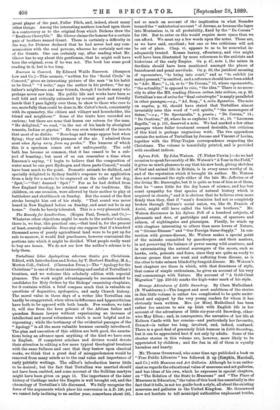Tartu/Jinni Leber Apologeticus adversus Gentes pro Christiania. Edited, with Introduction
and Notes, by T. Herbert Bindley, M.A., Merton Coll., Oxford. (Clarendon Press.)—The "Apology for the Christians" is one of the most interesting and useful of Tertullian's treatises, and we welcome this scholarly edition with especial pleasure. The work might advantageously be recommended to candidates for Holy Orders by the Bishops' examining chaplains, for it contains within a brief compass much that is valuable on questions of dogmatics, apologetics, and early Church history. The moral value in these days of a writer like Tertullian can hardly be exaggerated, when ultra-indifference and hypercriticism have both to be opposed with both hands. Few readers, we take it, will rise from the keen polemic of the African father and quondam Roman lawyer without experiencing an increase of intellectual and moral robustness which is most helpful and in- vigorating; while the testimony of the evidential passages of the " Apology " is all the more valuable because casually introduced. The plan and execution of this edition are both good, the annota- tions being an advance upon anything of the kind we have seen in English. If competent scholars and divines would devote their attention to editing a few more typical theological treatises with the same fullness and care that they bestow upon classical works, we think that a great deal of misapprehension would be removed from many minds as to the real value and importance of early patristic writings. The editor's introduction leaves little to be desired ; but the fact that Tertullian was married should not have been omitted, and some account of the Scillitan martyrs might have been given on page 15. The importance of the later history of Carthage under the Empire is well brought out, and the chronology of Tertullian's life discussed. We fully recognise the force of the arguments which place his conversion in A.D. 196, yet we cannot help inclining to an earlier year, somewhere about 185,
not so much on account of the implication in what Neander termed the " unhistorical account " of Jerome, as because the lapse into Montanism is, in all probability, fixed by the " De Corona" for 198. But to enter on this would require more space than we can afford. We must say a few words upon the notes. These are, as we have said, excellent ; but one or two criticisms will not be out of place. Chap. vi. appears to us to be somewhat in- adequately treated. Roman luxury, effeminacy, and vice might well have been illustrated by more references to the satirists and historians of the early Empire. On p. 47, note 1, the mines in Sardinia should have been mentioned amongst the places of banishment and penal servitude. On p. 59, the juridical meaning of reprasentare, "to bring into court," and so "to exhibit (or make) present," is omitted ; and a reference should have been added to "Adv. Marc." i., 14, or to "De Corona," 15, where reproisentatio, "the actuality," is opposed to Maio, "the idea." There is no neces- sity to alter the MS. reading Iliacum ezitum into ezitium, on p. 66. Tertullian's use of ezitus for "final catastrophe" is amply paralleled in other passages,—e.g., "Ad. Soap.," 4, exitu Byzantine. The note on angelus, p. 82, should have stated that Tertullian almost invariably uses this word of "evil spirits," "the messengers of Satan,"—e.g., " De Spectaculis," 4, passim ; "De Corona," 14 ; " De Oratione," 22, where he so explains 1 Cor. xi., 10. " Lasonum flagella," on p. 151, deserved a note. We had marked a few other passages where fuller treatment seemed desirable, but criticism, of this kind is perhaps ungracious work. The two appendices contain the notices of Tertullian by Jerome and Vincent of Lerins, together with the Pliny-Trajan correspondence respecting the Christians. The volume is beautifully printed, and is provided with excellent indices.






































 Previous page
Previous page